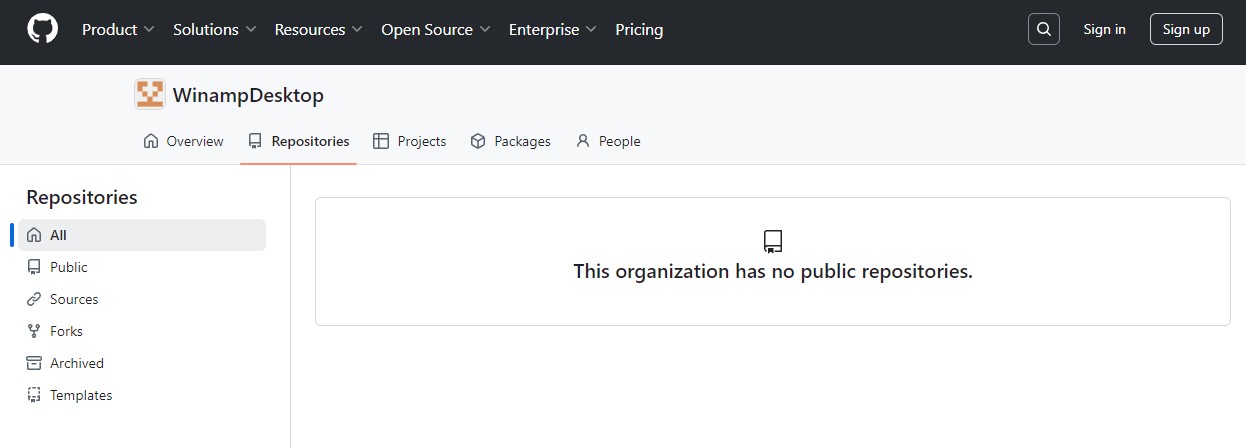Winamp owner deletes 'Open Source' repository after a bumpy month on GitHub
It seems that not all of the source code was its to share

The contents of Winamp’s “open source” GitHub repository has been deleted after less than a month. This move happened after its owners, Llama Group, received criticism from the free and open-source software (FOSS) community for its highly restrictive license. The original GitHub release was under the Winamp Collaborative License (WCL) 1.0, which states No Forking: You may not create, maintain, or distribute a forked version of the software. The deletion seemingly occured after The Register contacted the developers regarding the inclusion of Shoutcast DNAS code and some codecs from Intel and Microsoft.
The Register shared that some GitHub users noted in the comments of the project that this license actually violates the platform’s terms of service, and that the repository upload isn’t actually open source. This license was eventually revised to WCL 1.0.1, which changed the line to No Distribution of Modified Versions: You may not distribute modified versions of the software, whether in source or binary form. This means you can now build upon the code that Winamp uploaded to GitHub, but you won’t be able to share it with anyone. So, while the Winamp source code was online for all the world to see, it’s wasn't fully open source, as you cannot freely redistribute the modifications you make.
Aside from these licensing shenanigans, other GitHub users also noted that there were a few bits of code in Winamp’s release that it didn’t own (or didn’t own anymore) to begin with. The Register says this includes the server code for Shoutcast Distributed Network Audio Server (DNAS), which was originally developed by Nullsoft, the original owners of Winamp. The Llama Group eventually bought Winamp and Shoutcast, but it sold the latter to Azerion in 2022, meaning it doesn’t have the rights to the Shoutcast DNAS anymore. Proprietary Microsoft and Intel source code were spotted in the repository as well, which could potentially land the Llama Group in hot water with these giants.
It's likely because of these issues that it took down the Winamp repository from GitHub, and that we’re unlikely to see any form of Winamp — classic or otherwise — in any open-source platform. This legacy media player is just too old, with many proprietary bits and pieces coming from several other companies that won’t be too keen to see their code released to the world for free. It would take a massive investment and a lot of time to clean up Winamp’s back-end for an open-source release, but would anyone do it, knowing they wouldn’t make back a cent?
Get Tom's Hardware's best news and in-depth reviews, straight to your inbox.

Jowi Morales is a tech enthusiast with years of experience working in the industry. He’s been writing with several tech publications since 2021, where he’s been interested in tech hardware and consumer electronics.
-
GenericUser ReplyIt would take a massive investment and a lot of time to clean up Winamp’s back-end for an open-source release, but would anyone do it, knowing they wouldn’t make back a cent?
With how long it's been around and how popular it's been, you know there's someone who would do it. There are people who go to crazy lengths to preserve/resurrect their favorite software all the time. -
Pierce2623 Like what does Winamp do that Kodi or something else can’t do? I don’t get the big deal. I used Winamp back when it was modern but now I don’t really understand the draw.Reply -
Jame5 In it's original form it was self contained, extremely lightweight, fast, and the UI was very easy to use.Reply
Like launched from a 5400rpm hdd that was also running the OS in less than a second fast.
Most modern applications depend on SSDs to hide their launch times for their bloated software, or have a call home in them, etc.
Winamp just worked. (tm)
Audacious seems the closest in spirit to the original winamp, and it's FOSS and cross platform. I use it on my linux desktop systems.
For my Windows desktop my current player choice is Foobar2000 for local media playback. It is also a peer from the Winamp days. -
nitrium As a very long time user of Winamp, I've now switched to Aimp, which is basically the same as Winamp, but supports all the newest audio standards (including FLAC). No issues with it so far.Reply -
ottonis Well, they could have simply removed all the problematic/proprietary code lines, appropriately comment the missing lines in question and go full open source licence. Would have been a win-win for everybody.Reply
After all, WinAmp is a legendary piece of software that certainly deserves to live on the one or another way. -
bobingus Honestly glad to see it fall apart. It was such a transparent attempt at a company trying to leverage nostalgia and nerd passion to get free labor. They obviously intended to let the community bring the software into modern standard and no doubt had plans to monetize it when it was done.Reply
Glad to see that plan won't be coming to fruition. -
theillien ReplyIt would take a massive investment and a lot of time to clean up Winamp’s back-end for an open-source release, but would anyone do it, knowing they wouldn’t make back a cent?
Tell me you don't understand FOSS without telling me you don't understand FOSS. -
Justin Goldberg I still think it's a good idea. People love when the winamp software, and they want to contribute.Reply -
ForbiddenEra Woah.. SHOUTcast too? I know I at least have the sc_trans code because I'm the guy who ported it Linux. I might have had DNAS too but definitely never got access to the Winamp codebase. It was right around the time AOL bought out, so my contribution didn't last beyond the above described.Reply
Winamp, really whips the Llamas ass!
I miss running my shoutcast stations (idealsound, urban drop, frozen beats)
